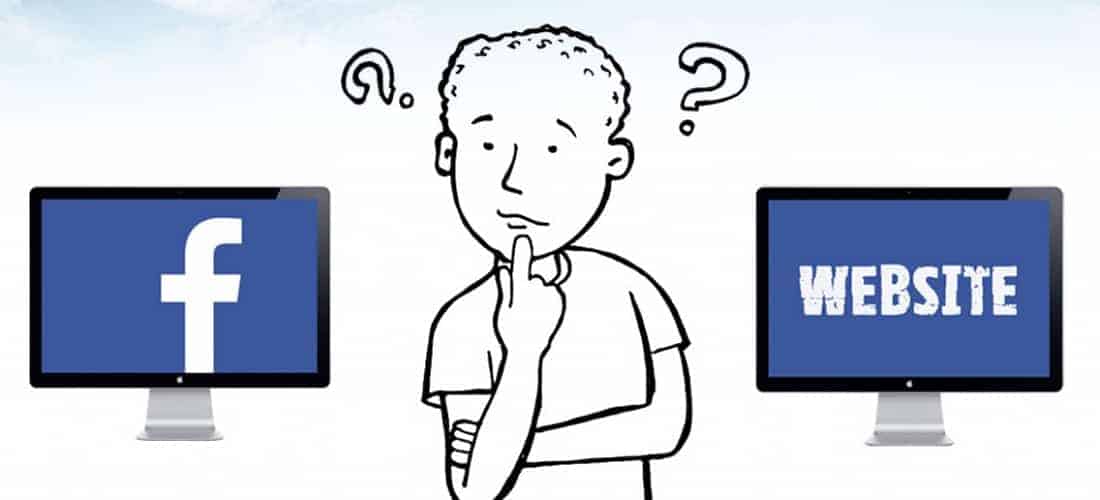Millions of businesses now have a Facebook page and it can be a useful tool when it comes to reaching your target audience and engaging with potential customers. But can a business Facebook page replace a website?
The short answer is no, but that’s not to say Facebook isn’t a very useful tool as part of your overall digital strategy. Let’s weigh up the Facebook versus website debate, focusing on some of the key considerations.
Potential reach of your Facebook business page and website
With Facebook you do have the potential to reach people you want to target. The advertising algorithms are fairly sophisticated and enable you to market yourself to those potential customers who may need your services but are not yet aware of your business.
If you’re social media savvy, there are ways and means of engaging with more people on Facebook through clever content such as videos, photos and updates. However, to really see value from your Facebook page, you do have to work at it, and be prepared to spend your money. Even if you do pay for advertising, the return on investment may not be worth it in terms of actual leads it generates for your business – and that’s assuming your customers are consumers who would be on Facebook. It is a much less useful tool for B2B companies.
Your website also has reach. The vast majority of online encounters start with a search – billions of searches are carried out on Google every day, and they are likely to be people in the market for what you have to offer. If you’re not online, you’re already losing out to the competition. With a good SEO strategy, you can cut through the noise to make sure your website is getting to the right people – and they’re already looking for your service.
Standing out from the crowd
As mentioned above, there are now millions of business pages on Facebook, and the more we ‘like’ the less we will see as there just physically isn’t enough time and space in your newsfeed to show you everything. Even if you’ve paid the money to ensure you get your business in front of people, there’s absolutely no guarantee that people will see, or act upon, your advert. Remember, Facebook is a very recreational pastime for many people and not necessarily a time when they want to be marketed to. This means you have to work extra hard to stand out.
Investing the same resources into things like Google AdWords and SEO can be much more effective when it comes to standing out from the competition, and at least then you’re getting your website in front of people shopping for what you have to buy. If you can get them to click on your website, you’ll have their undivided attention, even if only for a short time.
Business credibility
Say someone does happen to see your business page on Facebook and say they are potentially interested in your products or service etc. What’s the next thing they are likely to do? Chances are if you’ve piqued their interest they’ll go and search for your website. Even if you’re on Facebook, most people will still expect to see a website, and not having one can affect your credibility or give the impression you’re not as professional as the next business.
Building a business brand
It’s very hard to build a brand identity on Facebook, where one business page mostly looks like another. Your website can be exactly what you want it to be, built around your own domain name that people can search for, with your chosen images, descriptions, features and functionality. Essentially, you control the message and you can make a strong a first impression – and first impressions really do count.
If your business is a restaurant, for example, and people want to book online but find they can’t as you don’t have a website, you’re just making it easier for the competition round the corner that does have that function.
The full digital marketing package
Successfully marketing your business requires a multi-pronged attack – you have to come at it from all angles, and the most successful businesses are the ones which do just that.
So, you set up a Facebook business page and you manage to get some engagement and likes. A potential customer is motivated to find out more, so they visit your website, where you have your branding, your company story, some images. They might check out a case study, download an e-guide, read a blog, fill out a contact form or book a consultation.
All of these contacts form a key part of the sales process. From your website, you can collect email addresses and start marketing directly to those who want to receive your news and offers. While Facebook feeds into this, it’s just one of the many channels you can exploit that can all feed back to your website, together with a good SEO strategy to capture those searching for your services.
Your website is the central hub for all your digital content. From here, you can co-ordinate your content marketing strategy and share new and interesting information back out to your Facebook page and other channels.
Without a website, everything starts and ends with Facebook, and you’re only tapping into a small percentage of the possible market.
To conclude:
Facebook can be great for meaningful interaction and engagement, but it can also be hit and miss. A successful digital strategy relies on taking full advantage of a number of different channels, which should all feed back to your website, where you can sign them up to hear more, encourage them along the sales process and ultimately create sales.


